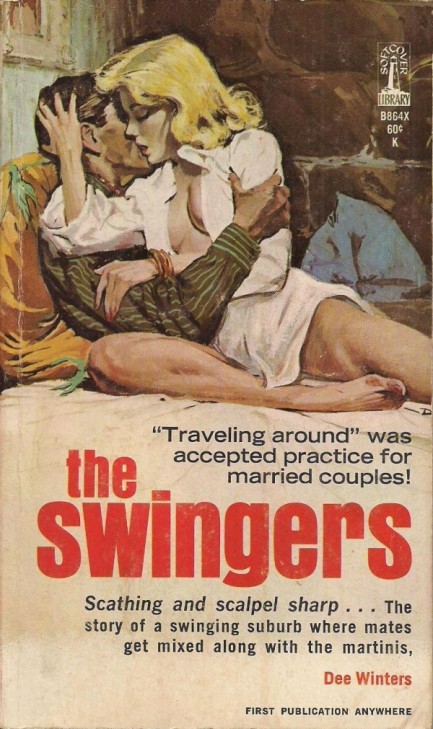 You know, you have marvelous muscle tone for a woman eleven feet tall. 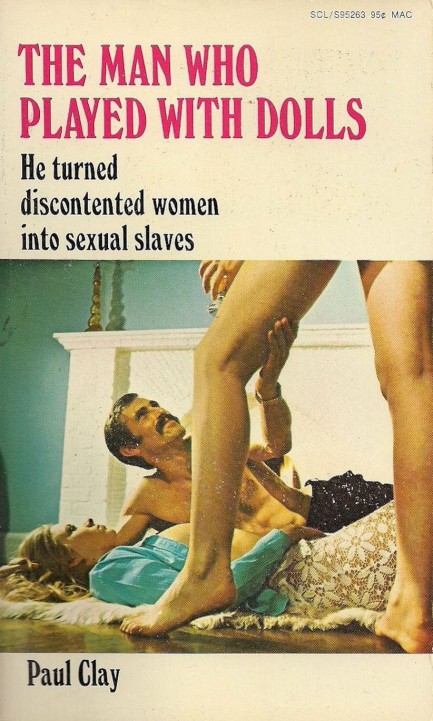
Above: a photo cover for the 1967 sleazer The Man Who Played with Dolls, written by Paul Clay for Softcover Library. “He turned discontented women into sexual slaves.” The Pulp Intl. girlfriends really got a kick out of that. Softcover, which evolved from Beacon Signal, provided the world with some pretty nice book fronts, including here, here, and here, but by this time was moving away from paintings to photos like all the publishers. What it didn't move away from was sleaze, its bread and butter, more of which we'll show you down the line, assuming we can ever stop looking at this one, with Dennis Weaver* copping a cheap feel. Hands off the merch, McCloud. *Probably not really Dennis Weaver.
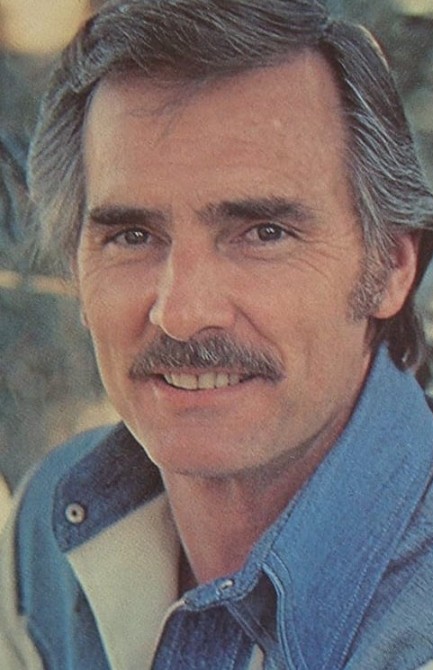
 I've studied organ rejection extensively. Trust me—mine is compatible with your body. 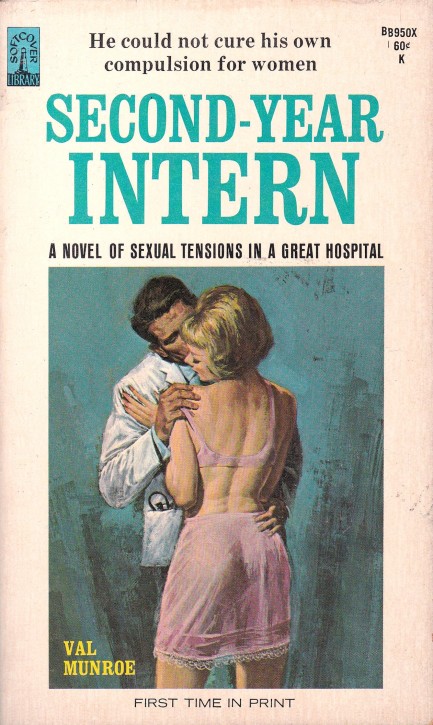
Yes, it's still more medical sleaze—1968's Second-Year Intern by Val Munroe, from Softcover Library with an uncredited cover. We told you we'll never run out of these, nor of stupid shit to say about them. Munroe, aka Frank Castle, wrote one of the better sleaze books of the 1950s in Carnival of Passion, which we discussed here. And here, actually. We'd love to see what he can do in a hospital setting, but with more than a hundred books to read, well, sometimes you have to say no.
 Wife trading this week. Wife trading last week. Why can't we just stay home and screw each other? 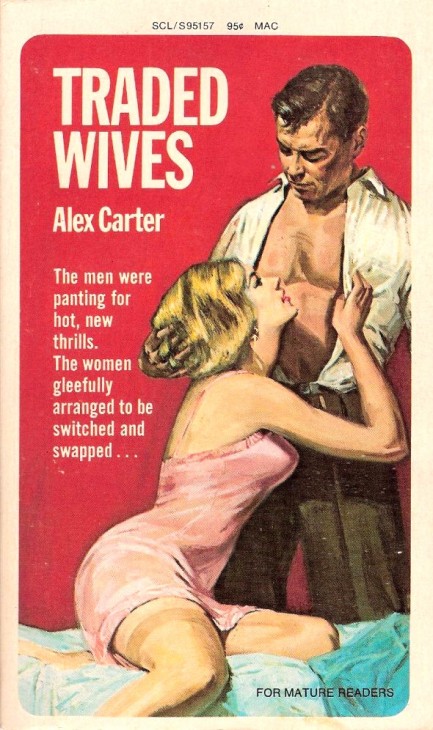
Above: a cover for Alex Carter's Traded Wives, copyright 1970, from Softcover Library. Alex Carter was a pseudonym of Charles Boeckman, Jr., and the art here is by Clement Micarelli.
 You can love her but you can never trust her. 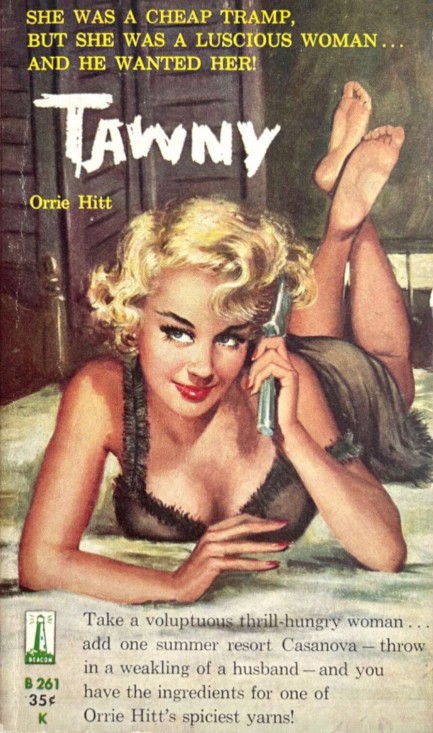
A while back we said we'd skip the 1954 Orrie Hitt novel Cabin Fever because we had several other Hitt books awaiting our attention. But the cover art for 1959's Tawny enticed us, so we bought it and—turns out we didn't pass on Cabin Fever after all, because Tawny is Cabin Fever published under a new name. It was also published yet again in 1974 as Lovers at Night. Lesson: watch out for re-titles in vintage literature. But it's okay. Hitt is interesting if erratic, and since this is an early effort from him—possibly only his third, though we can't be sure because he published four books in 1954—we were curious to have a look.
Tawny follows the travails of Danny O'Conner, who takes a job managing a sprawling lakeside roadhouse/casino/cabin complex called the Flying Red Rooster and quickly becomes romatically entangled with the boss's omnivorous wife, the eponymous Tawny Stone. She hates her husband but divorcing him would mean losing her stake in the business she originally financed. You'd think this would lead to the usual murder-the-husband scheme, but Hitt twists the plot the other direction when the husband approaches Danny and says that he wants Tawny to die or disappear.
So the question is who tries to kill who? Or maybe they both take a whack at homicide. We ain't saying. In the end, though, you still have juicy adultery and a sinister murder plot. We've read a lot of books along those lines, often by better writers, but we've read them by worse writers too. In the hands of a top stylist Tawny might have been a real barnburner. As it is, we can call it readable but not special. The art on this Beacon Signal edition (it was also published by Softcover Library in 1969) is by an unknown, which is too bad because it's one of the better covers on a Hitt novel. The far less tawny original painting appears below.
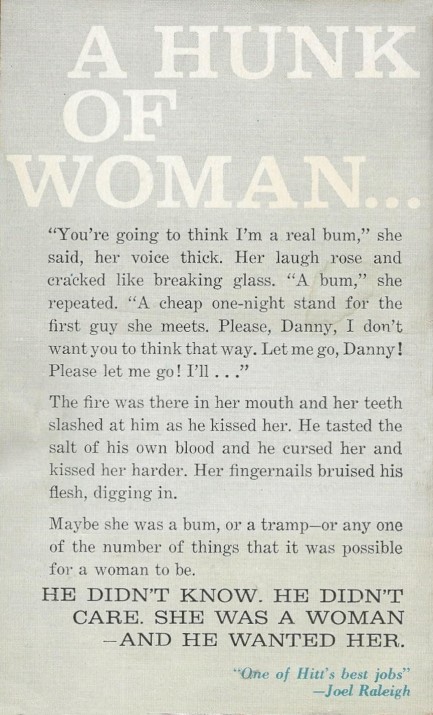 
 Is sex déjà-vu a thing? Because I feel like we've lived this before. Try not to finish so fast this time. 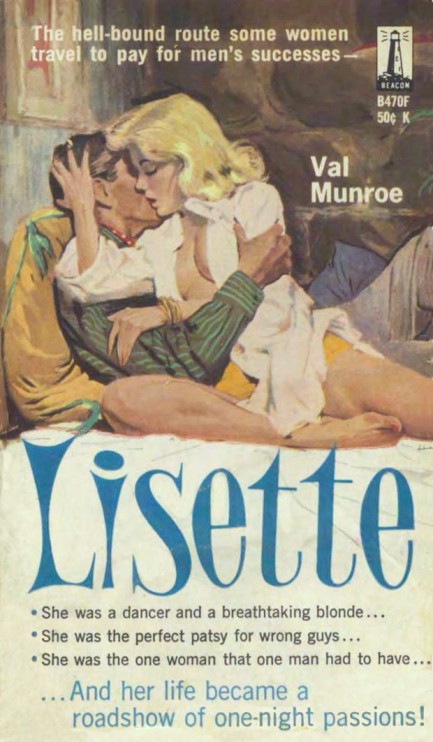
Above: a cover for Val Munroe's Lisette, painted by Darcy, aka Ernest Chiriacka for Beacon Signal, 1962. We were surprised when we discovered this was Munroe's Carnival of Passion under a different title. Since the name of the main character is Lisette rather than Liz, we didn't guess it was the same book, and you'll also notice the cover doesn't mention a carnival. Luckily we didn't pay for this because it was available for download on Archive.org. By the way, the story wasn't the only thing repeated here. The art was later paired with Dee Winters' 1965 sleazer The Swingers, as you see below.
 There are some places even sleaze novels shouldn't go. 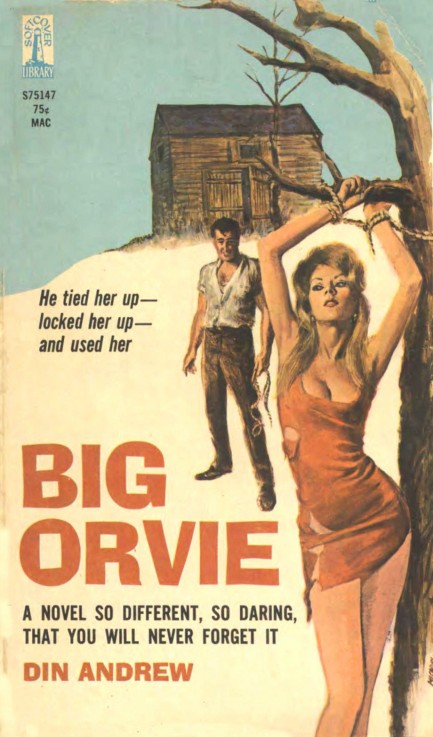
Above you see a cover for Din Andrew's 1965 novel Big Orvie. All the other websites we've visited have this art as by an unidentified person, but all the other websites have a slightly different cover (which we posted below) on which the woman is wearing a longer dress, the sky has an impressionist texture, and—crucially—the signature is simply missing. Our version is signed at bottom right by Clement Micarelli. Look there in the tree bark. See it? So we can officially rescue this from the unidentified bin. We always planned to share more art from him. Having found something not previously known to have come from his brush is a nice bonus. Our work is done for today.
On second thought, maybe not. There's the actual book to consider, isn't there? Was it banned at any point? Probably not, but we have to wonder. We expected Big Orvie to be lightweight sleaze. How foolish of us. This countrified taboo smasher dealing with a mentally disabled and oversexed bumpkin named Orville Stroup goes beyond mere sleaze. Some might even call it irresponsible, with its unflinching (but mercifully brief) forays into pedophilia. In fact, it's a book that, assuming its contents were widely known to the general public, you'd have a hard time explaining to your friends why you have it. Consider yourself advised. Now our work is done. 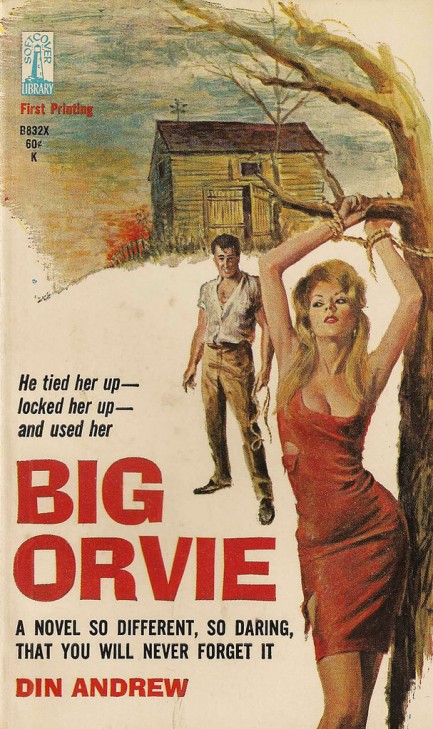
 That isn't the place where kisses make me go crazy. Think lower. A lot lower. 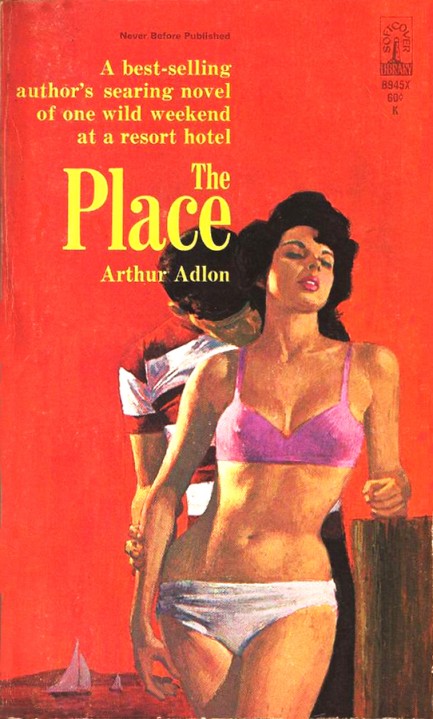
In The Place protagonist Bill Martin is a novelist whose sexual adventures have earned him the nicknames the Goat of Gotham and the Monster of Manhattan. He's separated from his wife Betty, but they're happy to get together for sex. Enter Rika Balsemis, founder of STAIS, which stands for the Society to Abolish Instant Sex. Bill sees her as another conquest, but try as he might he can't get in her pants. He even resorts to force at one point and gets judoed for his efforts. Rika explains, “I realized that in certain situations our members might encounter violence such as yours, so I took a course in judo. It's admirably suited for female use. Karate is too violent. I might have kicked you and ruined you for life. I know how.”
At this point thought we had Rika Aoki on our hands. We thought we had a character that was going to unleash martial arts madness across the storyline. We were looking forward to it. But there are no more ass whippings. Rika instead gives in to Bill, but sex is just a prelude to hypnotizing him into being totally unresponsive to further sexual stimuli. Yes—she eunuchs him with the power of her mind. It's hilarious, though not to Bill. You know this state of affairs won't last, and indeed Rika can cancel the spell when she wants to make use of Bill's goatly talents. But the point of the wider narrative becomes getting him back together with his wife Betty. Written in 1966, The Place is a middling effort by Arthur Adlon, aka Keith Ayling, written with some style but virtually no sex. With sleaze, we recommend you prioritize the latter over the former.
 You bet I want to eat hot cherry pie, Mrs. Baker! Who doesn't? I didn't even know you could cook. 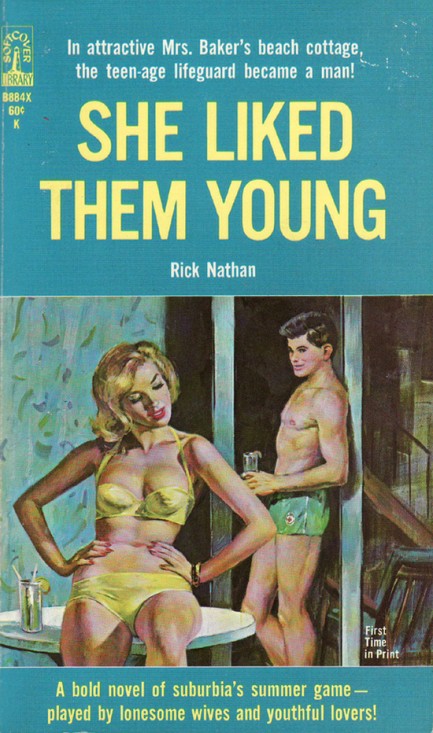
Above, a cover for She Liked Them Young by Rick Nathan, who was also author of Six for Love. This is a crossover sleaze entry, touching on lifeguards, suburbia, and older women with teenaged boys all at once. It's from 1965 for Softcover Library with uncredited art.
|
 |

The headlines that mattered yesteryear.
1939—Holiday Records Strange Fruit
American blues and jazz singer Billie Holiday records "Strange Fruit", which is considered to be the first civil rights song. It began as a poem written by Abel Meeropol, which he later set to music and performed live with his wife Laura Duncan. The song became a Holiday standard immediately after she recorded it, and it remains one of the most highly regarded pieces of music in American history. 1927—Mae West Sentenced to Jail
American actress and playwright Mae West is sentenced to ten days in jail for obscenity for the content of her play Sex. The trial occurred even though the play had run for a year and had been seen by 325,000 people. However West's considerable popularity, already based on her risque image, only increased due to the controversy. 1971—Manson Sentenced to Death
In the U.S, cult leader Charles Manson is sentenced to death for inciting the murders of Sharon Tate and several other people. Three accomplices, who had actually done the killing, were also sentenced to death, but the state of California abolished capital punishment in 1972 and neither they nor Manson were ever actually executed. 1923—Yankee Stadium Opens
In New York City, Yankee Stadium, home of Major League Baseball's New York Yankees, opens with the Yankees beating their eternal rivals the Boston Red Sox 4 to 1. The stadium, which is nicknamed The House that Ruth Built, sees the Yankees become the most successful franchise in baseball history. It is eventually replaced by a new Yankee Stadium and closes in September 2008.
|

|
|

It's easy. We have an uploader that makes it a snap. Use it to submit your art, text, header, and subhead. Your post can be funny, serious, or anything in between, as long as it's vintage pulp. You'll get a byline and experience the fleeting pride of free authorship. We'll edit your post for typos, but the rest is up to you. Click here to give us your best shot.

|
|













